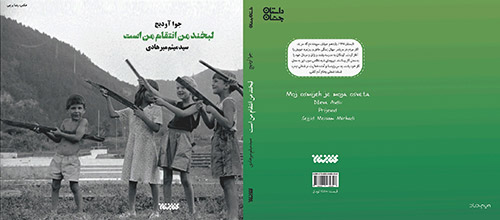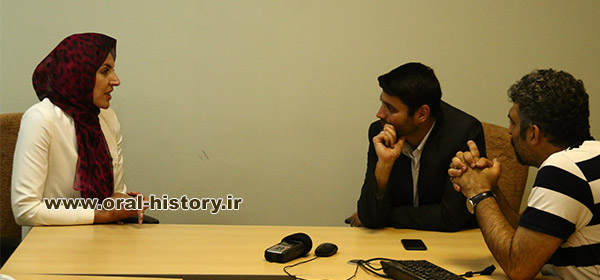Interview with Jowa Avdić
The Family of Hosseini and the Family of Avdić, Khoramshahr and Srebrenica
Interviewer: Mehdi Khanbanpour
Translated By: Fazel Shirzad
2018-8-21
Note: Jowa Avdić, the author of book "My Smile Is My Revenge", was born on August 26th, 1986 in "Zeleni Yadar", near Srebrenica. With the Serbian invasion to Bosnia and Herzegovina and the beginning of the war, Mrs. Avdić and his family are forced to immigrate to Srebrenica. At the time of the fall of Srebrenica, she was only 9 years old. He believes that for all those who survived the death of Srebrenica, tolerance for years of peace is far more difficult than the days of the war because they had become homeless in their homeland.

Jowa Avdić completed his education in political science and field of journalism at the University of Sarajevo, after graduating, he worked as a reporter in the newspaper named "Danoni Voice" in Bosnia and Herzegovina. But the effects of the war and the kind of look at the people of Srebrenica did not leave him alone. This led him to write the book "My Smile Is My Revenge" so that the narrator to be as pattern of all the hardships and difficulties that all survivors of Srebrenica were faced with them daily after the end of the war.
When the translation of book "Da" was being unveiled in Bosnia and Herzegovina Jowa Avdić said about comparing the disaster of Srebrenica with the events of the imposed war in Khorramshahr:" Those who have passed the horrors of the days of the war and survived, now speak in every language, and everywhere in the world they understand each other better. It was destined to read the translation of the book "Da" by the Iranian writer in March 2017. By reading the book, I found that the same history in two different periods took us. The sentence "history will be repeated" is not just an ordinary sentence; its evidence is living witnesses and the fate of humans; Iran in 1980s and Bosnia in 1990's. The book "Da" and book "My Smile is My Revenge", have been written for the victims so that the crimes of the criminals cannot be forgotten forever it should be repeated until the end of the world.
It is an opportunity for Iranian oral history site to talk to Mrs. Jowa Avdić
■
● Mrs. Jowa, tell about me some of Srebrenica's hard days!
My memory is about the time when we left Srebrenica (July 11, 1995). My father, who had involved in a battle, recently returned. We lived in a house in Srebrenica, of course, there wasn't house for us. Some of my father's comrades entered this house to take some tools and then go. The city had fallen and their lives were in danger. I was not yet nine years old and I could not understand that it would be our last visit with father. My father hugged me and I convoyed her. After the departure of my father and his friends, and in the noise of city I heard someone cried: Srebrenica fell. At that moment my mother took my hand and my brother's hand and drove out of the house without taking any device. The crowd was coming out of town. We joined the crowd, without knowing where we are going and having a clear goal. We came out of the city along the crowd, without knowing the fate that was waiting for us.

My mother, brother and I took two nights in Fotojarik. My mother did not sleep and saw the worst crimes. The Serbs separated the men inside the crowd and killed them. The third day we went to the buses that were going to move the crowd. My brother was 12 years old, and luckily we took him with us. If we had stayed in the Fotojarik on the third day, my brother would be definitely killed.
● could you explain about the logo is installed on your clothes?
It names "The flower of Srebrenica", and this is a flower about the crime that happened in this city. More precisely, it is a symbol of keeping memories of the victims of the Srebrenica disaster. Not only Srebrenica, but also a crime that has occurred all over Bosnia. This is the symbol of 11 mothers of martyrs circling a martyr coffin, a reminiscent of July 11, because there are still families whose loved children have been disappeared. The green color is a sign of these people's coffins.

●You have read book "Da". What impact did it have upon you?When I read the book "Da", I realize my book's introduction. "Da" is the first book I read from the literature of Iran. When I read this book, I felt as if I were the narrator of this book. In my opinion, the story of Zahra and Jowa is a story that is alike and similar, and there is difference that Zahra, when the war began, was older and naturally more responsible.
● Do You travel to Iran for the first time?
Yes
● What is the view of Bosnian people to Iran?
It is very friendly and the people of Bosnia know what great work Iranian people have done to them.
●What is your job?
I am a bank employee, but I have educated in the field of journalism and public relations.
● Thank you for spending time to talk us for a few minutes with all the fatigue of traveling
I also thank you and all the people of Iran. Given that about 20 years have passed since the days of our war, they still remember our martyrs, and this is very valuable.
Number of Visits: 5389








The latest
- Oral History News of Khordad 1404 (May 22nd – June 21st 2025)
- Najaf Headquarters Human Resources
- The Embankment Wounded Shoulders – 12
- Annotation
- The 367th Night of Memory– 5
- The Founder of Hosseiniyeh Ershad
- The Embankment Wounded Shoulders – 11
- The Role of the Bazaaris in the Final Days of the Islamic Revolution
Most visited
Memoirs of Hujjat al-Islam Reza Motalebi
Hujjat al-Islam Reza Motalebi is a cleric from Isfahan. Before the revolution, he was the imam of the Fallah Mosque – which was later renamed Abuzar Mosque. By his presence and efforts, Abuzar Mosque soon became a base for supporters of the Imam and the revolution. After the victory of the revolution, he played a role in uniting forces and maintaining political vitality in southwest Tehran.The Necessity of Receiving Feedback in Oral History
Whenever we engage in a task, we naturally seek ways to evaluate our performance — to correct shortcomings and enhance strengths. Such refinement is only possible through the feedback we receive from others. Consider, for instance, a basketball player whose shots are consistently accurate; should he begin shooting blindfolded, his success rate would rapidly decline, as he would be deprived of essential feedback from each attempt.Sir Saeed
The book “Sir Saeed” is a documentary [narrative] of the life of martyr Seyyed Mohammad Saeed Jafari, written by Mohammad Mehdi Hemmati and published by Rahiyar Publications. In March 2024, this book was recognized as one of the selected documentary biographies in the 21st edition of the Sacred Defense Book of the Year Award. The following text is a review on the mentioned book.Morteza Tavakoli Narrates Student Activities
I am from Isfahan, born in 1336 (1957). I entered Mashhad University with a bag of fiery feelings and a desire for rights and freedom. Less than three months into the academic year, I was arrested in Azar 1355 (November 1976), or perhaps in 1354 (1975). I was detained for about 35 days. The reason for my arrest was that we gathered like-minded students in the Faculty of Literature on 16th of Azar ...

